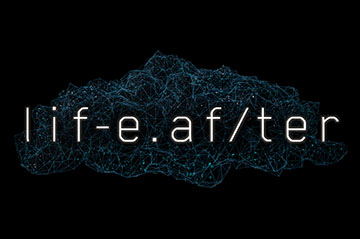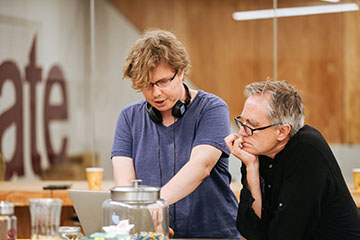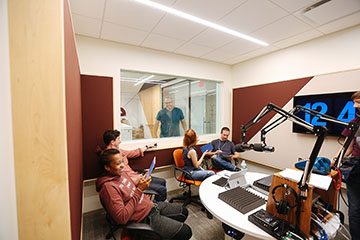
From GE Podcast Theater and Panoply, the producers of The Message, comes a new thriller, LifeAfter. The 10 episode series follows Ross, a low level employee at the FBI, who spends his days conversing online with his wife Charlie—who died eight months ago. But the technology behind this digital resurrection leads Ross down a dangerous path that threatens his job, his own life, and maybe even the world.
Listen to the LifeAfter teaser trailer:
https://megaphone.link/PNC5362479238
Subscribe to the LifeAfter podcast:
https://megaphone.link/PP7122869346
LifeAfter on iTunes:
https://itunes.apple.com/us/podcast/lifeafter/id1045990056
Perhaps the concept of digital reconstruction of a dead loved one is a common trope in science fiction. Film, television, and novels have all taken on the moral repercussions of playing “God” to varying degrees of success. LifeAfter, an audio drama podcast from Panoply and GE Podcast Theater, does so with heart and an attention to real science that should please even the most cynical hard science fiction fan.
At its core, LifeAfter is a love story. It’s about second chances. It’s pessimistic about technology, yet optimistic that human cleverness will save the day. And all three of these plot concerns come together in a powerful and surprising final act in the last episode that will make you want to listen to the whole series again in order to appreciate the payoff even more.
On the production side, the acting is far better than in most audio dramas. The sound design is top notch and immersive. The writing … well … the writing is outstanding. And that’s why I reached out to the writer of LifeAfter to get his thoughts on his creation.
APEX MAGAZINE: So much of science fiction has always been concerned with the abusive nature of humanity’s ambitions and the power of technology. It certainly is a concern of Apex Magazine, and I think of your podcasts The Message and LifeAfter. Are your views regarding the application of technology as pessimistic as it presents itself in your fiction?
MAC ROGERS: I was talking to a computer scientist about this recently, that I often feel like a hypocrite when I spend half a day writing a technology-run-amok story and then the other half of the day enjoying the fruits of technology. So what I try to do is present a mixed, as complex a picture as possible. While a lot of the peril in both The Message and LifeAfter is technology driven, so, too, are the solutions (Kalpana’s ultrasound “anti-Message,” Octavia’s digital duplicate of LifeAfter). That way the burden is placed back where it should always be placed: on human judgment.
In Part 9 of LifeAfter we learn that Sasha’s most destructive actions are the result of her attempting to carry out her human creator’s absurdly broad and impossible mission: “End all the grief in the world.” It’s entirely possible that the LifeAfter program and its component technology could have been used for much more beneficial purposes had it not been irreparably twisted by its maker. This is the secret of much of my favorite science fiction: that it’s not about aliens or groundbreaking technology, but rather about human reactions to aliens or groundbreaking technology. These tropes are lights we shine upon ourselves.
AM: One thing that stands out about The Message and LifeAfter is that the shows do not contain advertising content. Since GE is the corporation backing the podcasts and ostensibly stands to gain brand content, do they give input regarding the technologies featured (real or imagined)?
MR: When I initially accepted the job writing The Message in 2015, I assumed I was taking on what would essentially be a straight advertising job, more copywriting than scriptwriting. I thought the whole script would be built around highlighting GE tech. I was completely wrong about this. GE and Panoply were both very clear right off the bat that while they definitely wanted some GE tech worked into the storyline, their foremost priority was to produce an exciting, thoughtful audio drama. Obviously people are inclined to say nice things about their employers, but in this case I think the proof is right there in the podcasts: references to medical ultrasound and digital twin technology are present in The Message and LifeAfter, but they clearly aren’t allowed to overwhelm the story, for which as a writer I was grateful.
That said, being able to talk directly to folks from GE about the technology presented in both podcasts was enormously helpful, particularly in terms of getting that “five-minutes-into-the-future” immediacy I was shooting for. I wanted all the tech (the human tech at least, with The Message’s aliens all bets were off) to have some basis in real-life research and development, even if I extrapolated it into very fictional places. When you can make the technology in a science fiction story feel like the kinds of things we’re already dealing with in more nascent, early forms, it gives the story a feeling of plausibility that heightens it, makes it more suspenseful, more visceral.
AM: I love that the worlds of The Message and LifeAfter are one and the same. Having Nicky Tomalin from The Message appear in your LifeAfter teaser was brilliant. Are you building a grander storytelling arc, or will each series standalone (like the television show Black Mirror, for instance)?
MR: I would love that! It’s a bit out of my hands. It will be up to GE and Panoply as to whether they will choose to do more GE Podcast Theater series, and whether I will continue to be the writer if so. They have a whole separate set of considerations on their end. For me, I’d love to be able to bring LifeAfter’s Octavia Roth character onto The Message’s Cyper team to tackle a science fiction mystery together–maybe involving the return of Nicky Tomalin!
I originally wrote the references to The Message in LifeAfter as inside jokes to amuse myself, never thinking they’d make it all the way to the final edit, but I was thrilled when they did. The fact that those lines actually got broadcast makes it canon! And I can see from social media that has meant a lot to fans and listeners as well. Most folks who love genre entertainment love shared universes and crossovers, and I’m definitely one of them.
AM: Perhaps the meta-commentary wasn’t intentional, but I am amused by the irony that it is the snippets and snapshots of our lives (private viral moments) that create the AI-constructs in the Voicetree app. In our ever-shortening attention span world, what goes into the production that helps keeps the audience engaged?
MR: Well, podcasts and other audio entertainment have one small structural advantage: people can enjoy them while they do other things: wash dishes, work out, commute, vacuum. So audio can compete for those slots of time in people’s lives where they need their eyes free to do some job, but they can still take in entertainment through their ears.
But beyond that, those snippets and snapshots you mention are I think a big part of what brings people back. The fact that we get to hear some characters’ voice-posts, that we get to hear slivers of their ordinary lives when they’re not living in a techno-thriller, means that when the suspense does crank up, that suspense is happening to people who feel real to us, who aren’t just ciphers moving through a plot. If people didn’t care about Ross and Charlie’s messed-up love story LifeAfter would be sunk. All the twists and all the tech wouldn’t save the show without that investment. Getting those glimpses into their non-double-agent lives helps to win that listener investment.
AM: The tonal shift of the show adjusts as Ross goes from depressed, lowly FBI tech to a revelatory unveiling of character growth that helps give texture to the plot. How much of this stuff is outlined in advance and how much is it by the seat of your pants?
MR: I outlined LifeAfter with tremendous intricacy. I always outline, I always figure out the plot in advance and put it down as bullet-points, but usually my outlines take up about a page. LifeAfter’s final outline was over 20 pages, with every plot point articulated. There were just so many moving parts, so many relationships, concepts, and plot twists that needed to be properly set up early on so they didn’t feel like cheats. And even then, so much changed! The key to writing a mystery is many, many rewrites, many drafts, to make sure all the clues are not only in place, but that they each serve to move the emotional side of the story along as well. I wouldn’t have been able to get through a script like LifeAfter without outlining. I have a number of friends who tell me they write their first drafts without outlining, discovering the story organically as they go along. And many of them have produced wonderful work through this process. But it simply doesn’t work for me. I need an outline or I drown.
AM: Softball time. What inspires you?
MR: I love stories about irrational love, stories about huge, out-of-control crazy-love that makes people achieve more than they ever imagined they could. These aren’t necessarily sweet, inspiring stories; love can lead you to plenty of dark places as well. But the key is that a good love story should push its lead character well out of their comfort zone into a place filled with peril, whether physical or emotional peril, or both. I knew LifeAfter would stand or fall on whether listeners could believe that Ross would risk so much just to hear his dead wife’s simulated voice. I knew if people found that ridiculous, we’d lose them one or two episodes in. But I thought of successful examples of this sort of approach—the detective’s obsessive love for the deceased title character in the classic film noir Laura, or (more familiar to many genre readers) Detective Miller’s beyond-the-grave devotion to Juliet Mao in the Expanse books and television series. I knew it could work, so that gave me the courage to try it. And to my great gratitude, many listeners were willing to go along for that ride.













